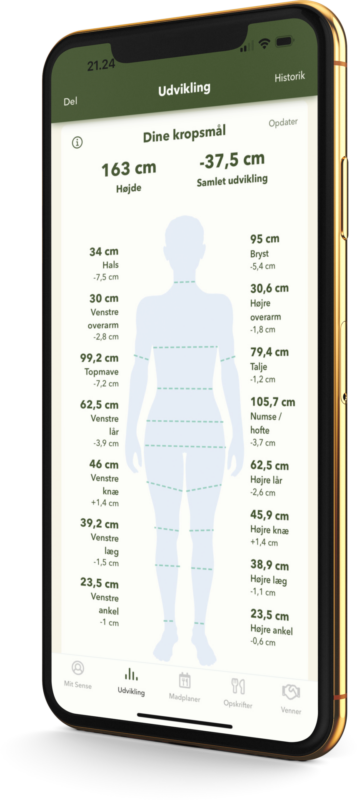Be the first to try SenseMyDiet in English!
Sign up and get a free GLP-1 diet plan and try SenseMyDiet for free!
SenseMyDiet is going global with an English version. Sign up for our newsletter to be the first to know when we launch.

Are you curious about your Body Mass Index (BMI)? Our user-friendly BMI calculator is designed to give you an overview of the relationship between your weight and height. Your BMI can give you a quick assessment of whether you are underweight, overweight, or within the normal range. Always remember that a BMI calculation is not a complete and accurate measurement of your health or body composition.

Your BMI calculation should never stand alone
It is important to know that a BMI does not provide a complete picture of your body’s health status. BMI cannot differentiate between muscle and fat. The calculation automatically assumes that changes in weight are due to variations in fat mass, while muscle mass remains constant.
A low BMI generally suggests that you have normal muscle mass and low fat mass. Conversely, a high BMI generally suggests that you have normal muscle mass and high fat mass.
The reality is often more nuanced.
Challenges with BMI often arise when a person’s muscle mass exceeds the average level. This means that a high BMI can be the result of significant muscle mass rather than high fat mass. According to the BMI scale, individuals with a value above 25 are considered overweight, regardless of whether their BMI value is due to high muscle or fat mass. Thus, athletic and muscular individuals can be classified as overweight according to the BMI calculator, even if their fat level is within the normal range.
For individuals with high muscle mass, measurements such as waist circumference and waist-to-hip ratio may be more accurate indicators of whether the weight is healthy.
Maintaining a healthy weight is central to minimizing the risk of disease. However, health is a complex area that involves much more than your body weight. It is important to understand that both overweight and underweight can increase the risk of various health conditions and diseases.
Overweight can increase the risk of lifestyle diseases such as cardiovascular diseases, diabetes, certain types of cancer, and mental disorders, including depression.
On the other hand, underweight can lead to a deficiency of essential nutrients, which can result in conditions like iron deficiency, osteoporosis, and reduced fertility. Additionally, underweight can weaken the immune system and reduce resistance to diseases and infections.
The risk of disease is not isolated to body weight alone. Many factors play a role, such as genetics, smoking habits, alcohol consumption, sleep patterns, stress levels, and physical activity level. Although a healthy weight can contribute to overall well-being and health, it is crucial to have a holistic approach to health and wellness, recognizing that health consists of many different components.
Eating a balanced and nutritious diet, engaging in regular physical activity, getting adequate rest, and maintaining low stress levels are just as important aspects of health as maintaining a weight within the normal range. A healthy lifestyle involves a combination of all these elements, working together to promote overall health and well-being.